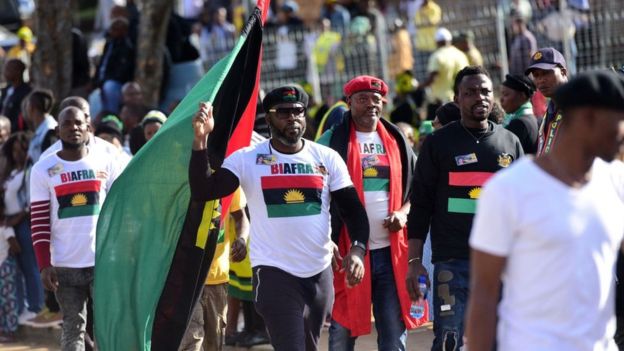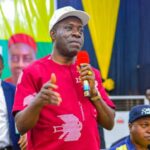The Indigenous People of Biafra (IPOB) was recently ranked as the 10th deadliest terror group in the world by the Institute for Economics & Peace (IEP), an independent and non-profit think tank (headquartered in Sydney (Australia) with offices in six countries) in its 2023 global terrorism index (GTI) ranking. The institute said IPOB was responsible for 57 deaths, 40 attacks and 16 injuries, to place 10th on the list.
Though the IEP said its report “provides a comprehensive summary of the key global trends and patterns in terrorism over the last decade,” and that “the calculation of the GTI score considers not only deaths but also incidents, hostages and injuries from terrorism, weighted over a five-year period,” data independently gathered by Daily Trust from news reports in Nigerian newspapers showed that IPOB had much more killings to its name.
A total of 148 deaths and 111 attacks were recorded in the year under review, as the Daily Trust tally showed. The casualties of IPOB attacks included 43 policemen, 20 soldiers, 71 civilians, as well as two officials each of the Federal Road Safety Corps, Nigeria Customs Service, Nigerian Correctional Service (Prisons), and the National Drug Law Enforcement Agency. There were also six attacks on the Independent National Electoral Commission offices, three attacks on courts of law, 19 attacks on police stations and nine attacks on police checkpoints. The number could as well be higher as some incidents go unreported.
Interestingly, the report by IEP is coming at about the same time the Abuja Division of the Court of Appeal fixed October 16, 2023, to hear IPOB’s appeal challenging its proscription and labeling as a terrorist organisation by the federal government. It would be recalled that the Abuja branch of the Federal High Court had on September 20, 2017, granted an order proscribing IPOB as a terrorist organisation following an application by the federal government.
IPOB ranked world’s 10th deadliest group
Adamawa gov’ship: Fintiri kicks as Binani demands results review
In dismissing the report, the IPOB’s media and publicity secretary, Emma Powerful, in a statement, said it was disappointing that a reputable organisation such as IEP would descend so low to publish “fictional and inaccurate accounts in their 2022 terrorism index report”.
The statement further stressed that “In the same report, IPOB was mentioned as the third most violent group that has caused civilian deaths. We challenge IEP to present irrefutable evidence of where IPOB killed any person in Nigeria. On the contrary, there exists verifiable evidence, both in print and social media, on the massacre and extrajudicial killings of many IPOB members by Nigeria security agencies since 2017.’’
With Boko Haram and Islamic State West Africa (ISWA) already a regular feature on the global terrorism index, the addition of IPOB should be a cause for concern, especially with its implication for the nation’s security as well as economic and social wellbeing.
While IPOB may see their position on the terrorism index as a major statement on the global stage, Nigeria must come up with a counter-strategy to protect the innocent Nigerians in communities where IPOB is most active.
While the outlawed group had in the past advanced various reasons for its struggles, including self-determination and bringing to an end what it termed as “endemic injustice perpetrated against the harmless and peace-loving people of Biafra by the Nigerian State in collaboration with the colonial powers,” it has been going about it the wrong way, with its persistent use of violence.
Already, many say what IPOB is fighting for is not what the South East needs. Today, because of IPOB’s violent activities, many parts of the South East have been militarized, with the ubiquitous presence of troops.
The idea of self-determination is not new, but for now, Nigerian laws do not have space for a referendum. To have that will mean to amend the constitution, which interested parties can do through their representatives at the National Assembly.
A lot can be achieved through the democratic space. If IPOB, which is now reportedly engaged in a supremacy battle between Nnamdi Kanu and Simon Ekpa, is about the development of the South East region, members can join politics, win elections and serve their people. First, they must denounce violence in unmistakable terms.
There are lessons to learn from the Scottish National Party, founded in 1934, with the express aim of achieving an independent Scotland through “civic nationalism” rather than violent insurgency which is now the dominant political force in Scotland. It now controls 45 out of the 59 Scottish seats in the House of Commons at Westminster, and forms the regional Scottish government at Holyrood, a feat it would never have achieved with the use of violence. IPOB and its members can learn from that.
For its part, the Nigerian government must review its strategies towards addressing this issue. It must also pursue policies that give all citizens a sense of belonging and being part of the system with the same legal rights, not just in the South East but all across the country.
Most of the agitations in the country may be the result of feelings of exclusion. People must see a country in which they have equal rights, and where they can achieve their highest possible potential. This is what the government must do.

 Join Daily Trust WhatsApp Community For Quick Access To News and Happenings Around You.
Join Daily Trust WhatsApp Community For Quick Access To News and Happenings Around You.

